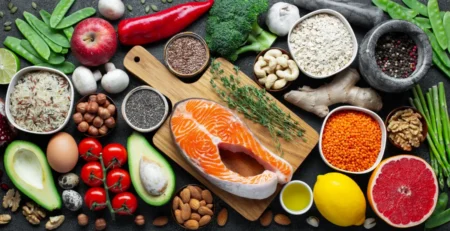Nutritional Tips for Healthy Menopause: Navigating the Change with Confidence
admin2024-02-08T19:45:42+00:00
Menopause is a natural phase in a woman’s life, marking the end of her reproductive years. While it brings about a sense of freedom from menstruation and contraception, it can also come with a range of physical and emotional challenges. One way to ease the transition and maintain overall health during menopause is through proper nutrition.
1. Prioritize Calcium and Vitamin D
Menopause is a natural phase in a woman’s life, marking the end of her reproductive years. While it brings about a sense of freedom from menstruation and contraception, it can also come with a range of physical and emotional challenges. One way to ease the transition and maintain overall health during menopause is through proper nutrition.
2. Embrace Phytoestrogens
Phytoestrogens are natural compounds found in certain foods that mimic the effects of oestrogen in the body. During menopause, when oestrogen levels drop, consuming phytoestrogen-rich foods can help alleviate some symptoms. Soy products like tofu and edamame, flaxseeds, chickpeas and whole grains are all great sources of phytoestrogens.
3. Load Up on Fruits and Vegetables
A diet rich in fruits and vegetables offers numerous health benefits, especially during menopause. These foods are packed with vitamins, minerals and antioxidants that can help manage weight, reduce the risk of chronic diseases and combat mood swings. Aim for a variety of colourful options to ensure a broad spectrum of nutrients.
4. Stay Hydrated
As we age, our sense of thirst may decrease, but staying properly hydrated is essential for overall health. Dehydration can worsen symptoms like hot flushes and increase the risk of urinary tract infections. Aim to drink at least eight glassess of water daily (2.1 litres) and consider incorporating hydrating foods like watermelon, cucumber and celery into your diet.
5. Manage Weight Through Balanced Eating
Many women experience weight gain during menopause, which can lead to various health and confidence a issues. To manage your weight effectively, focus on portion control and balanced eating. Opt for lean proteins, whole grains and healthy fats, while limiting sugary and processed foods. Regular physical activity is also helpful for maintaining a healthy weight.
6. Control Sugar Intake
Menopause can bring about changes in metabolism, making it easier to gain weight and develop insulin resistance. To manage blood sugar levels and reduce the risk of diabetes, limit your intake of refined sugars and processed carbohydrates. Choose natural sweeteners like honey or opt for fresh fruits when your sweet tooth calls.
7. Incorporate Omega-3 Fatty Acids
Omega-3 fatty acids, found in fatty fish like salmon, walnuts, and flaxseeds have anti-inflammatory properties and can help alleviate symptoms like joint pain and mood swings. Including these foods in your diet can contribute to overall well-being during menopause.
8. Consult a Healthcare Professional
Every woman’s experience of menopause is unique, so it’s crucial to consult with a healthcare professional or nutritionist. They can provide personalised guidance and recommend supplements if necessary to address specific nutritional deficiencies or health concerns.






Leave a Reply
You must be logged in to post a comment.